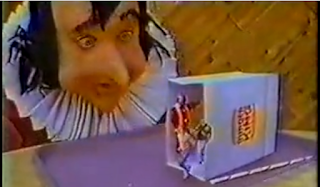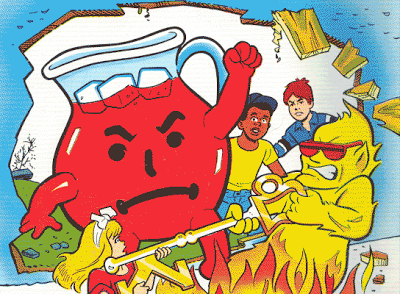While discussing Burger King at work, I mentioned The Duke of Doubt. It was another one of those moments where a bunch of people had no idea what the hell I was talking about.
I’m writing here to prove I didn’t make this up.
In the 1970’s when McDonald’s had a menagerie of Krofft-like mascots including Grimace, Mayor McCheese, the Hamburgular and Ronald McDonald, Burger King offered it’s own cast of characters including the Burger King and his royal foil: the Duke of Doubt.
Screenwriters say your movie is only as good as your villain, and the ongoing Burger King “story” features a disturbing putty-nosed bad-guy. The Duke bears a striking resemblance to the Child-catcher from CHITTY CHITTY BANG BANG. (A connection that would make sense to children of the 70’s who grew up with such movies. Again, when I made this comparison my co-workers had no clue what I was babbling about.)
Hamburgular was Ronald McDonald’s number one foe because he stole other people’s food. Even in his criminal activity, Hamburgular is reinforcing the message that McDonald’s burgers are delicious; so much so that he will break the law to obtain them!
But the Duke doesn’t covet food-stuffs. His principle role is to question the King. He’s like a villain in a Jacobean drama, lurking in the shadows and plotting against His Royal Highness. (The Duke also reminds me of Grima Wormtongue from Lord of the Rings.)
What I find most surprising in this ad campaign is that skepticism is portrayed as a bad thing. Kids are inherently curious, even suspicious. Doubt is a healthy part of any free society, it shouldn’t be portrayed as villainous.
Well I hope you’ve enjoyed this latest installment of me taking the wrong things seriously. Maybe I’ll do an entire series about advertising mascot’s straw-men nemeses.







mark leffingwell
Your analysis of the "Duke of Doubt" series of Burger king commercials is pretty good.
Unfortunately, I'm a bit concerned that you have tried to hard to force the unfolding BK events and characters into preconceived story devises or" templates". Please forgive my tone if I seem condescending, but how do you know that the King himself was not the villain?
The Duke's concern was for the welfare of customers, and specifically the children. The King was seen as heroic because of his overall regal presentation, but evil comes in many disguises.
The duke of doubt's persistence and dedication were to be admired, even in the face of constant humiliation and ridicule. I can recall many examples of the abuse he was expected to endure:
* The "Sir Shakealot" picnic bench/ catapult fiasco.
* His many attempts to demonstrate magic tricks himself. These displays often resulted in violent falls,beatings with magic brooms, or most frighteningly his close proximity to dangerous gorillas.
* Who could forget the disco party which climaxed with the duke imprisoned in a jukebox, reminiscent of stockade punishment in colonial America.
I hope you have a chance to research and reconsider your knee-jerk opinion of the mighty Duke.
Thank you for your time and consideration.
Mark Leffingwell
Kevin Maher
Hey Mark,
I think we're saying the same thing differently.
I don't think the Duke is a bad guy, I think doubt is a good thing.
I don't remember the jukebox stockade. I want to see that.
Ultimately, regardless of how we interpret the King or the Duke their rivalry could be simplified as petty envy. The Duke wishes he were King, he's envious of the King's popularity. That's a common character trait in kids' cartoons and TV shows and movies.
Thanks for your thoughtful response, I love it when people take this stuff seriously.
Kevin
joecab
I haven't been able to get the Disco Doubt song out of my head since I was a kid. Here's the Burger King disco commercial, complete with being stuck in the jukebox: http://www.youtube.com/watch?v=-4yWP6DMhgo
Kevin
Thanks for that Joe — I'd never seen the disco commercial before. It's haunting all right, the disco floor is mildly unsettling.